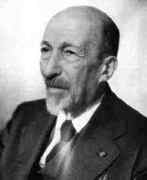Person: Hadamard, Jacques Salomon

Jacques Hadamard was a French mathematician whose most important result is the prime number theorem which he proved in 1896. This states that the number of primes $<n$ tends to infinity as fast as $\frac{n}{\log_e(n)}$.
Mathematical Profile (Excerpt):
- Between the surrender and the signing of the treaty there was essentially a civil war in Paris and the Hadamards' house was burnt down.
- The war was not the only cause of sadness for the Hadamards.
- In 1884 Hadamard took the entrance examinations for École Polytechnique and École Normale Supérieure; he was placed first in both examinations.
- Hadamard obtained his doctorate in 1892 for a thesis on functions defined by Taylor series.
- In the same year Hadamard received the Grand Prix des Sciences Mathématiques for his paper Determination of the number of primes less than a given number.
- He never submitted an entry for the prize but Hadamard, between the time his thesis was submitted and his oral examination, realised that his results could be applied to zeta functions.
- The year 1892 was significant for Hadamard in addition to the academic achievements described above.
- They moved to Bordeaux the following year when Hadamard was appointed as a lecturer at the University.
- This theorem was conjectured in the 18th century, but it was not proved until 1896, when Hadamard and (independently) Charles de la Vallée Poussin, used complex analysis.
- Solving this important open problem was not Hadamard's only remarkable contribution of 1896.
- The topic proposed for the prize had been one on geodesics and Hadamard's work in studying the trajectories of point masses on a surface led to certain non-linear differential equations whose solution also gave properties of geodesics.
- Another result which Hadamard published during his time in Bordeaux was his famous determinant inequality of 1893.
- Matrices whose determinants satisfied equality in the relation are today called Hadamard matrices and are important in the theory of integral equations, coding theory and other areas.
- At first Hadamard, like many people, assumed that Dreyfus was guilty.
- Hadamard took an active part in clearing Dreyfus's name which finally happened on 22 July 1906, when Dreyfus was reinstated and decorated with the Legion of Honour.
- Long before the Dreyfus Affair had ended Hadamard had, as we have indicated, moved from Bordeaux to Paris.
- Hadamard received the Prix Poncelet in 1898 for his research achievements over the preceding ten years.
- Poincaré had strongly supported Hadamard for this chair but, within a few months, he died at the tragically young age of 58.
- Hadamard then undertook the hugely difficult task of surveying Poincaré's work and by the end of the summer of 1912 he had produced two major articles.
- Near the end of 1912 Hadamard was elected to the Academy of Sciences to succeed Poincaré.
- Both were killed at Verdun and Hadamard was lecturing in Rome when Pierre was killed.
- Hadamard knew only one way to push the pain of these tragedies away enough to allow him to keep going, and that was to throw himself even more vigorously into mathematics.
- Hadamard left the United States soon after and spent a year in England before returning to Paris as soon as was possible after the end of the war.
- One further tragedy was to hit Hadamard before his death.
- This seemed to finally kill Hadamard's spirit and he did not leave his house after this, almost waiting to die.
- There is no way that an article of this length can even indicate the range of Hadamard's mathematical contributions.
- As well as about 300 scientific papers and books Hadamard also wrote books for a wider audience.
- We should also, however, indicate Hadamard's style of teaching.
Born 8 December 1865, Versailles, France. Died 17 October 1963, Paris, France.
View full biography at MacTutor
Tags relevant for this person:
Astronomy, Number Theory, Set Theory, Special Numbers And Numerals, Topology
Thank you to the contributors under CC BY-SA 4.0! 

- Github:
-

- non-Github:
- @J-J-O'Connor
- @E-F-Robertson
References
Adapted from other CC BY-SA 4.0 Sources:
- O’Connor, John J; Robertson, Edmund F: MacTutor History of Mathematics Archive
